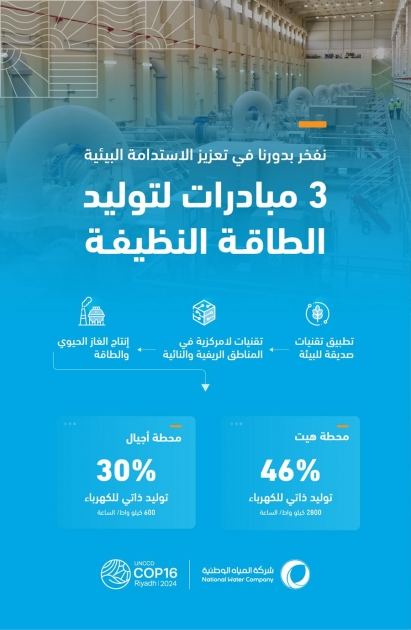
NWC succeeds in producing clean energy from Heet and Ajyal plants
National Water Company (NWC) has succeeded in producing clean energy through wastewater treatment in Heet in Riyadh and Ajyal plant in the Eastern Region. This production is done by converting the emissions resulting from wastewater treatment processes into a source of energy; by transforming wastewater treatment plants (STPs) into environmentally friendly plants to achieve a sustainable environmental sector that develops resources, reduces costs, reduces pollution sources and provides safe supply through high quality services and environmentally friendly efficiency.
The company said: "At NWC, we have a vision and an environmental commitment to provide and ensure world-class water services across the Kingdom to improve the quality of life of citizens in their everyday lives and in the future. This is part of the Kingdom of Saudi Arabia's commitment to achieve many of the purposes and goals of treating water pollution and reusing treated water as part of the Saudi Vision 2030".
The company has embarked on three main initiatives to generate clean energy from renewable sources. The first initiative is the management of the sludge resulting from wastewater treatment processes (biogas and energy production). The second is the procurement and operation of decentralized wastewater treatment technologies in rural and remote areas. The third is the application of environmentally friendly and economical technologies for wastewater and sludge treatment. NWC pointed out that it has a vision that focuses on maximizing the use of sludge through reuse to meet environmental protection requirements, protect public health, and achieve the principles of sustainable development and circular economy.
The company announced its readiness to start applying the initiative to generate clean electricity through the production of biogas from sludge as an advanced technology for its reuse. NWC selected two wastewater treatment plants to (STPs) implement its project. It applied in Ajyal plant in the Eastern Region and the Heet plant in Riyadh.
The company explained that biogas is produced through anaerobic (oxygen-free) digestion of sludge, which is based on the biodegradation of organic matter by anaerobic bacteria, producing biogas (methane gas), which is used as a fuel in the production of electricity. NWC stated that it succeeded in producing 600 kWh of electricity from biogas at the Ajyal plant to cover 30% of its own electricity consumption, while it produced about 2800 kWh at Heet plant to cover 46% of its basic electrical energy needs.
The company pointed out that the generation of clean energy from wastewater treatment plants has many benefits, the first of which is the environmental benefit of reducing greenhouse gas emissions and is a key requirement for environmental compliance by protecting soil, groundwater and surface water from pollution, and the digested sludge from biogas production units can be reused as fertilizer to improve the quality of agricultural land, reclaim it and increase yields. The economic benefits of implementing the Clean Energy Initiative in wastewater treatment plants are the reduction of financial costs and the conservation and use of resources by turning sludge into an economic resource.
NWC is currently working with the relevant authorities to obtain permits and complete the necessary approvals to produce biogas and renewable energy for the company's own use with its plants.


























